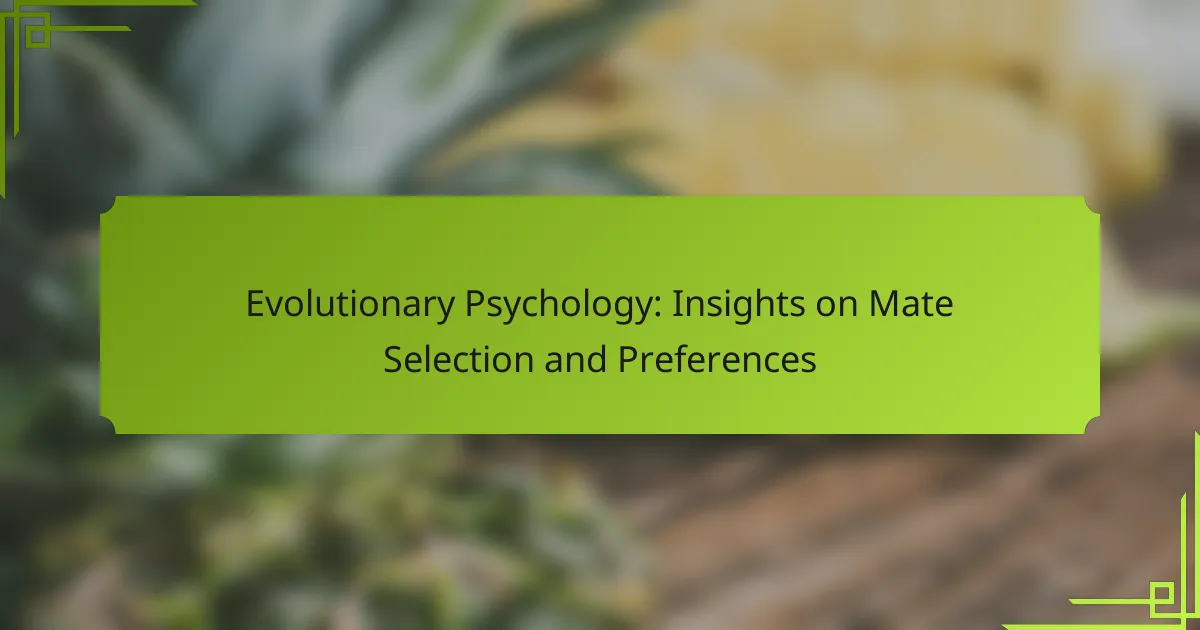Understanding mate selection can enhance relationship satisfaction and compatibility. Evolutionary psychology reveals innate preferences shaped by survival needs, emphasizing traits like physical attractiveness and social status. Cultural influences further diversify these preferences, while unique attributes can create deeper connections. By applying these insights, individuals can improve their mate selection strategies and foster healthier relationships.

What is the role of evolutionary psychology in mate selection?
Evolutionary psychology plays a crucial role in mate selection by providing insights into the innate preferences and behaviors that shape human attraction. This field suggests that certain traits, such as physical health and social status, are prioritized due to their implications for reproductive success. For example, women may prefer partners who display resources or indicators of stability, while men often seek youth and fertility cues. These patterns highlight the evolutionary pressures that influence mate choice, ultimately guiding individuals toward partners who enhance their reproductive potential. Understanding these dynamics can inform modern dating practices and relationship dynamics.
How do evolutionary theories explain human mating preferences?
Evolutionary theories suggest that human mating preferences are shaped by biological imperatives aimed at maximizing reproductive success. These preferences often prioritize traits associated with health, genetic fitness, and resource availability. For example, physical attractiveness may signal good health, while social status can indicate the ability to provide for offspring. Research shows that men typically value youth and physical beauty, whereas women often prioritize stability and resource acquisition. These patterns reflect underlying evolutionary pressures that influence mate selection strategies across cultures.
What are the key factors influencing mate choice?
Mate choice is influenced by several key factors, including genetic compatibility, physical attractiveness, and social status. These elements play a significant role in evolutionary psychology, shaping preferences and selection criteria.
Genetic compatibility ensures healthier offspring, while physical attractiveness often signals good genes and vitality. Social status can indicate resource availability and stability, making potential mates more appealing.
Additionally, cultural factors and individual experiences further refine mate selection, showcasing both root and unique attributes of personal preference. Understanding these influences provides insight into the complex dynamics of human relationships.
What role do physical attractiveness and health play?
Physical attractiveness and health significantly influence mate selection and preferences in evolutionary psychology. Attractive individuals often signal good health, promoting reproductive success. Research shows that traits like symmetry and clear skin are perceived as indicators of genetic fitness. Additionally, health-related factors, such as physical fitness, enhance desirability, as they suggest vitality and longevity. This interplay of attractiveness and health shapes mating strategies across cultures, reflecting deep-seated evolutionary drives.
How does social status affect mate selection?
Social status significantly influences mate selection by shaping preferences and perceptions of desirability. Individuals often seek partners with higher social status, associating it with resources and stability. This preference can manifest in various ways, such as attraction to wealth, education, and social connections, which are perceived as indicators of a partner’s potential to provide for offspring. Research indicates that both men and women prioritize social status, though the emphasis may vary based on cultural and individual factors. Ultimately, social status serves as a critical attribute in the evolutionary psychology of mate selection.
What universal attributes characterize mate preferences across cultures?
Mate preferences across cultures share universal attributes such as physical attractiveness, social status, and compatibility. These traits are often prioritized due to evolutionary factors influencing mate selection. For example, physical attractiveness signals health and fertility, while social status reflects resource availability and stability. Compatibility fosters emotional connection and shared values, enhancing relationship success. These attributes, rooted in biological imperatives, manifest uniquely across different cultures, yet their core significance remains consistent globally.

What unique attributes influence individual mate selection?
Unique attributes influencing individual mate selection include physical attractiveness, social status, and personality traits. These factors vary by individual preferences and cultural contexts. For example, physical attractiveness often signifies health and fertility, while social status can indicate resource availability. Personality traits, such as kindness or humour, enhance compatibility and long-term relationship satisfaction. Additionally, evolutionary psychology suggests that these attributes have developed over time to enhance reproductive success and survival.
How do personal experiences shape mating preferences?
Personal experiences significantly influence mating preferences by shaping individual values and expectations. These experiences, including upbringing, social interactions, and past relationships, create a framework for attraction and compatibility. For instance, individuals who have positive familial relationships may prioritize traits like kindness and stability in partners. Additionally, personal encounters can highlight unique attributes that become essential in mate selection, such as shared interests or specific lifestyle choices. As a result, the interplay between personal history and evolutionary psychology reveals how preferences are not only instinctual but also deeply rooted in individual experiences.
What psychological traits are commonly sought in partners?
Individuals often seek traits such as kindness, intelligence, and emotional stability in partners. These psychological traits enhance relationship satisfaction and stability. Kindness fosters empathy and support, while intelligence stimulates engaging conversations. Emotional stability contributes to conflict resolution and overall relationship health. Research indicates that these attributes align with evolutionary preferences for long-term partnerships.
How does attachment style impact mate selection?
Attachment style significantly influences mate selection by shaping preferences and relationship dynamics. Individuals with secure attachment styles tend to seek partners who are emotionally available and supportive. In contrast, those with anxious or avoidant attachment styles may gravitate toward partners who reinforce their insecurities or fears. Research indicates that attachment styles can dictate the perceived attractiveness of potential mates, affecting long-term relationship satisfaction. Understanding these patterns can enhance awareness of personal behaviors and choices in romantic contexts.
What is the importance of shared values and interests?
Shared values and interests are crucial for mate selection as they enhance compatibility and relationship satisfaction. When individuals align on core beliefs and passions, it fosters deeper emotional connections. Research indicates that shared values significantly predict relationship longevity, as they promote understanding and reduce conflict. Furthermore, common interests facilitate enjoyable interactions, reinforcing the bond between partners. The unique attribute of shared values is their ability to create a strong foundation for mutual support and growth within a relationship.

What rare attributes can significantly affect mate choice?
Rare attributes can significantly affect mate choice by influencing perceived genetic fitness and compatibility. Traits such as unusual physical features, unique behavioral patterns, or distinctive vocalizations can attract potential partners. For instance, rare genetic markers may signal health advantages or resilience to diseases, enhancing attractiveness. Additionally, uncommon interests or hobbies can create deeper emotional connections, fostering attraction through shared experiences. Such rare attributes can set individuals apart, making them more desirable in the competitive landscape of mate selection.
How do specific cultural practices influence mate selection?
Cultural practices significantly shape mate selection by influencing preferences and behaviors. For instance, collectivist cultures prioritize family approval in mate choice, while individualistic societies emphasize personal compatibility. Unique attributes such as rituals and traditions can also determine acceptable traits in partners, leading to variations in preferences across cultures. As a result, understanding these cultural influences provides insights into the diverse factors driving mate selection globally.
What role do uncommon personality traits play in attraction?
Uncommon personality traits can enhance attraction by signaling unique genetic advantages. Traits like openness, creativity, and confidence often stand out, making individuals more appealing. Evolutionary psychology suggests these traits can indicate resourcefulness and adaptability, which are attractive in mate selection. For instance, individuals with rare traits may exhibit better problem-solving skills, enhancing their desirability as partners.
How can genetic factors influence mate preferences?
Genetic factors significantly shape mate preferences by influencing traits such as physical appearance, personality, and compatibility. Research indicates that individuals often select partners who exhibit genetic diversity, enhancing offspring survival. For example, variations in genes linked to immune response can lead to preferences for mates with different genetic backgrounds, promoting healthier progeny. This genetic inclination toward diversity is a unique attribute of human mate selection, showcasing the interplay between biology and attraction.

How do mating preferences vary across different cultures?
Mating preferences vary significantly across cultures due to differing social norms, values, and environmental factors. For instance, in collectivist societies, family approval often influences mate selection, while individualistic cultures may prioritize personal choice. Research indicates that preferences for physical attractiveness, financial stability, and personality traits differ based on cultural context. In some cultures, traits like loyalty and family orientation are highly valued, whereas others may emphasize independence and ambition. These variations highlight the unique attributes of mate selection influenced by cultural backgrounds.
What are the cultural differences in mate selection criteria?
Cultural differences in mate selection criteria vary significantly across societies. Factors such as socioeconomic status, education, and family values influence preferences. For instance, collectivist cultures often prioritize familial approval, while individualistic societies may emphasize personal compatibility. Unique attributes, like cultural traditions or religious beliefs, can also shape mate selection. In some cultures, arranged marriages remain common, highlighting the role of social structures in choosing partners.
How do societal norms shape preferences for partners?
Societal norms significantly influence partner preferences by shaping ideals of attractiveness and relationship dynamics. These norms dictate standards for desirable traits, often prioritizing characteristics like wealth, status, and physical appearance. For example, cultures that value collectivism may favor partners who exhibit strong familial ties and social connections. As a result, individuals often select mates based on perceived compatibility with societal expectations. Unique attributes, such as cultural traditions, can further refine these preferences, leading to varied partner choices across different societies.

What are the implications of mate selection on relationships?
Mate selection significantly influences relationship dynamics, shaping compatibility and long-term satisfaction. Individuals often prioritize traits like physical attractiveness, intelligence, and kindness, which can lead to successful partnerships. Evolutionary psychology suggests that these preferences are rooted in survival and reproductive strategies. For example, selecting a mate with strong genetic traits can enhance offspring viability. Additionally, social and cultural factors modify these preferences, leading to unique attributes in mate selection across different societies. Understanding these implications helps individuals navigate their choices and foster healthier relationships.
How do mating preferences affect long-term relationship satisfaction?
Mating preferences significantly influence long-term relationship satisfaction by aligning partners’ values and expectations. Research indicates that compatibility in preferences leads to greater relationship stability and fulfillment. For instance, individuals who prioritize similar traits, such as kindness or ambition, often report higher levels of satisfaction. Moreover, evolutionary psychology suggests that these preferences stem from ancestral survival strategies, where selecting a compatible mate enhanced reproductive success. As a result, understanding and aligning mating preferences can foster deeper emotional connections and long-lasting partnerships.
What common mistakes do people make in choosing partners?
People often make mistakes in partner selection by prioritizing superficial traits, overlooking compatibility, and ignoring red flags. These errors stem from evolutionary biases and societal pressures that distort true preferences.
One common mistake is focusing on physical attractiveness while neglecting emotional connection and shared values. Research indicates that long-term satisfaction relies more on compatibility than initial attraction.
Another frequent error is settling for partners who exhibit controlling or manipulative behaviors. Individuals may rationalize these traits, leading to unhealthy relationships. Recognizing these red flags is crucial for ensuring a healthy partnership.
Lastly, many people fail to consider their own relationship goals, which can lead to mismatched expectations. Understanding personal desires and communicating them clearly can enhance partner selection and relationship outcomes.

What best practices can enhance mate selection strategies?
To enhance mate selection strategies, individuals should focus on developing self-awareness, improving social skills, and understanding evolutionary psychology principles. Self-awareness helps identify personal preferences and values. Strong social skills facilitate better communication and connection with potential partners. Understanding evolutionary psychology can reveal innate preferences, guiding individuals toward compatible mates. Additionally, seeking diverse experiences can expand one’s perspective and increase opportunities for meaningful connections.
How can individuals optimize their mate selection process?
Individuals can optimize their mate selection process by understanding their preferences and aligning them with evolutionary psychology principles. Recognizing traits that signal genetic fitness, such as physical health and social status, can enhance choices. Additionally, evaluating compatibility in values and interests fosters long-term relationships. Engaging in self-reflection to clarify personal desires and non-negotiables strengthens decision-making. Seeking diverse social environments increases exposure to potential partners, enriching the selection pool.
What expert insights can improve understanding of attraction?
Evolutionary psychology offers insights into mate selection and preferences by emphasizing biological and social factors. Attraction is influenced by traits signaling fertility, health, and genetic fitness. For example, physical symmetry often correlates with perceived attractiveness, as it may indicate genetic quality. Additionally, social status and resources play a crucial role in mate preferences, especially in women, who often prioritize stability. Understanding these dynamics can enhance awareness of attraction’s complexities, revealing how evolutionary pressures shape human relationships.
